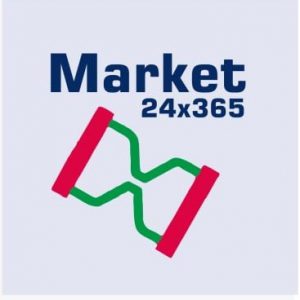
Forex is one of the fastest-growing areas for new traders to get started. The main reason for this is the low entry-level (only a few hundred dollars for mini accounts) and that it is fairly straightforward to trade.
The word FOREX is derived from Foreign Exchange and is the largest financial market in the world. Forex is often abbreviated to FX.
As the name implies, Forex is the exchange of one currency for another at an agreed-upon rate.
Unlike many markets, the FX market is open 24 hours per day and has an estimated $6.2 Trillion in turnover every day. This tremendous turnover is more than the combined turnover of all the world’s stock markets on any given day. This tends to lead to a very liquid market and, thus, a desirable market to trade.
Unlike many other securities, the FX market does not have a fixed exchange. It is primarily traded through banks, brokers, dealers, financial institutions and private individuals. Trades are executed through phone and increasingly through the Internet.
It is only in the last few years that the smaller investor has been able to gain access to this market. Previously, the large amounts of deposits required precluded the smaller investors.
With the advent of the Internet and growing competition, it is now easily in the reach of most traders.
You will often hear the term INTERBANK discussed in FX terminology. This originally, as the name implies, was simply banks and large institutions exchanging information about the current rate at which their clients or themselves were prepared to buy or sell a currency.
Inter- meaning between and bank meaning deposit-taking institutions normally made up of banks, large institutions, brokers or even the government. The market has moved on to such a degree now that the term interbank now means anybody who is prepared to buy or sell a currency. It could be two individuals or your local travel agent offering to exchange Euros for US Dollars.
You will find, however, that most of the brokers and banks use centralized feeds to ensure the reliability of the quote.
It is estimated that anywhere from 70-90% of the FX market is speculative. In other words, the person or institution that bought or sold the currency has no intention of actually taking delivery of the currency. Instead, they were solely speculating on the movement of that particular currency.
Currencies are traded in pairs and are each assigned a symbol. For the Japanese Yen it is JPY, for the Pounds Sterling it is GBP, for Euro it is EUR and for the Swiss Frank, it is CHF.
So EUR/USD would be Euro-Dollar pair. GBP/USD would be pounds Sterling- Dollar pair and USD/CHF would be Dollar-Swiss Franc pair and so on.
You will always see the USD quoted first with few exceptions, such as Pounds Sterling, Euro Dollar, Australia Dollar, and New Zealand Dollar. The first currency quoted is called the base currency.
Even though the mighty US dominates many markets, most of Spot Forex is still traded through London in Great Britain.
The Main Players in Forex
- Central Banks and Governments : Policies that are implemented by governments and central banks can play a major role in the FX market. Central banks can play an important part in controlling the country’s money supply to ensure financial stability.
- Banks : A large part of FX turnover is from banks. Large banks can literally trade billions of dollars daily. This can take the form of a service to their customers or them, themselves, speculate on the FX market.
- Hedge Funds : As we know the FX market can be extremely liquid, which is why it can be desirable to trade. Hedge Funds have increasingly allocated portions of their portfolios to speculate on the FX market.
Another advantage Hedge Funds can utilize is a much higher degree of leverage than would typically be found in the equity markets. - Corporate Businesses : The FX market mainstay is that of international trade. Many companies have to import or export goods to different countries all around the world.
Payment for these goods and services may be made and received in different currencies. Many billions of dollars are exchanged daily to facilitate trade. The timing of those transactions can dramatically affect a company’s balance sheet. - The Man in the Street : Although you may not think it, the man in the street also plays a part in today’s FX world. Every time he goes on holiday overseas, he normally needs to purchase that country’s currency and again change it back into his own currency once he returns.
Unwittingly, he is, in fact, trading currencies. He may also purchase goods and services whilst overseas and his credit card company has to convert those sales back into his base currency in order to charge him. - Speculators and Investors : We shall differentiate speculators from investors here with the definition that investors have a much longer time horizon in which they expect their investment to yield a profit as was discussed earlier. Regardless of the difference, both speculators and investors will approach the FX market to exploit the movement in the currency pairs.
They both will have their reason for believing a particular currency will perform better or worse as the case may be and will buy or sell accordingly.
They may decide that the Euro will appreciate against the US Dollar and take what is called a long position in Euro. If the Euro does, in fact, gain ground against the US Dollar they will have made a profit.

For Trade in Forex Market open Account with Market 24×365
Feel free to drop me a line if you have any questions or suggestions that may improve us. www.hnd-ventures.com









